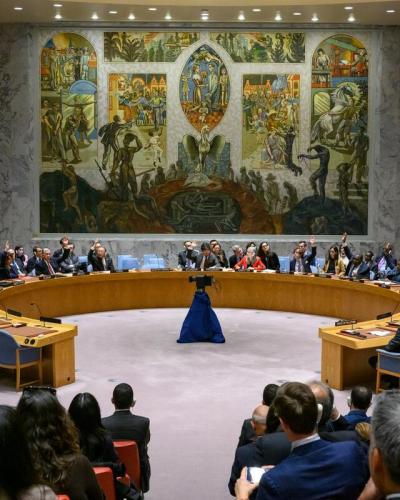The UN General Assembly today adopted a resolution in favor of a humanitarian ceasefire and increased humanitarian aid to Gaza. Last Friday, a resolution with much the same content failed in the UN Security Council due to a US veto. The resolution, which was presented to the 193 UN member states in the General Assembly by Egypt on behalf of the Arab states, calls for
- An immediate humanitarian ceasefire
- Compliance with international humanitarian law by both parties to the conflict
- The protection of the Israeli and Palestinian civilian population
- The immediate release of all remaining hostages
During the negotiations on the draft resolution submitted by the United Arab Emirates (UAE) to the UN Security Council for a vote last Friday, Switzerland succeeded in ensuring that the demand for the protection of civilians on both sides and for the immediate release of all remaining hostages was included in the draft text.
The resolution addresses the most pressing need in the Middle East: The protection of civilians on both sides. After the vote, Switzerland emphasized its support for the resolution and called for its implementation. It also explained that its understanding of a humanitarian ceasefire is a temporary humanitarian pause that does not affect Israel's right to defense and security. Finally, Switzerland recalled that the parties to the conflict must comply with their obligations under international humanitarian law and respect human rights. The Federal Council discussed the draft Security Council resolution at its meeting on 8 December 2023.
The General Assembly also voted today on two amendments proposed by Austria and the USA. The Austrian amendment called for a clarification that the hostages are being held by Hamas and other groups, while the US amendment condemned Hamas' acts of terrorism since October 7. Both amendments failed due to a lack of majority. Switzerland also supported these two motions.
Unlike UN Security Council resolutions, General Assembly resolutions are not binding under international law. Against this background, the resolution adopted today is primarily a signal. It should be seen as a recommendation by a majority of the international community. A 2/3 majority is required for the General Assembly to adopt resolutions in the area of peace and security. The resolution adopted today has a humanitarian focus and refers to UN Secretary-General Guterres’s letter of December 6, in which he called on the Security Council to take action to alleviate the humanitarian emergency in the Gaza Strip.




